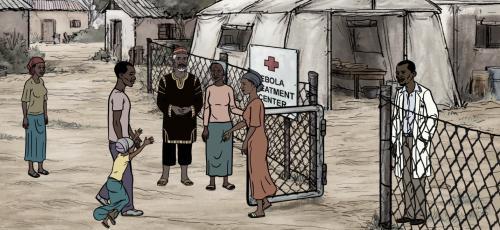
Remember the panic that ensued when the United States encountered its first cases of Ebola? Despite the parade of experts across our First World television screens, misinformation, fear and confusion spread faster than the virus. Imagine how a family living in a small village in Western Africa feels to see health workers clad in dehumanizing protective gear descending upon their homes. Reach deep for empathy for the family whose loved one was wrapped in a body bag and hauled away with no traditional ceremony. Consider the fear and confusion that clouds judgment and results in reactions that give a virus undeserved power.
The Global Health Media Project has produced a cartoon video, The Story of Ebola, in collaboration with the International Federation of Red Cross and Red Crescent Societies (IFRC), UNICEF, and award-winning cartoonist Yoni Goodman. The video presents the Ebola virus in scientific, yet understandable terms for West African countries still facing the viral threat.
The challenge was to relate the concept of an "invisible germ" as something that can be fought through understanding of how Ebola is spread. Preventive behavior is the key to winning the fight against Ebola. Ebola is small. Ebola is a germ. It is not a superhuman entity. Villagers have the power to take control of this disease, and the Story of Ebola tells them how to accomplish this.
In an email conversation Deborah Van Dyke, Director of the Global Health Media Project, said "We set the narrative in the communities where people are at risk so the story feels like it's about them, relatable." Currently translated in French, Portuguese, Swahili, Kissi, Krio, Thembe, and Fular, the goal is to provide voice-overs in those and in a number of other West African languages as funds become available.
The Story of Ebola is skillfully presented through the eyes of a young girl whose revered grandfather dies from the virus. The family is confused, frightened and saddened when the grandfather is taken away without the benefit of a traditional burial. This is a double loss. The health care worker, who is from the community and thankfully not a foreigner, explains how Ebola is spread and how a simple thing like regular hand-washing is a vital tool in prevention.
The visuals are simple, direct and clearly understood. Purple coloring is a stand-in for the invisible virus, making it real, but less frightening. Seeing is believing. Knowledge is power.
The girl's mother also contracts Ebola, but because she is treated early, survives. The drama ensues when her parents initially decide to run away, fearing that the health care workers are the source of death, instead of the virus. The young girl is the heroine of the film, convincing her frightened parents to go to the clinic immediately. Of course, the mother survives.
I especially like the animated visual of the sun rising and setting to represent the passage of time. It is a very African concept. The connection with nature is soothing in the midst of the frightening drama that unfolds.
The end result is that a complicated scientific message is delivered in an easy to understand format.
Ebola has not been eliminated. Just this week, the New York Times reported that a young woman died hours after being admitted to an Ebola treatment unit in Liberia. This was the second Ebola fatality since Liberia was declared free of the virus on May 9. Six Liberians have been infected since then.
"The new cases in Liberia show us that that our efforts should not be focussed on becoming Ebola-free, but on staying Ebola-free," said Savita Naqvi, UNICEF Regional Advisor on Communications for Development in a press release. "It's not over yet and no one should drop their guard. We need to continue working with communities, keeping them engaged and vigilant, even beyond zero new cases."
Correction: Translations, but not productions, have been completed in other languages, as noted in original post.

